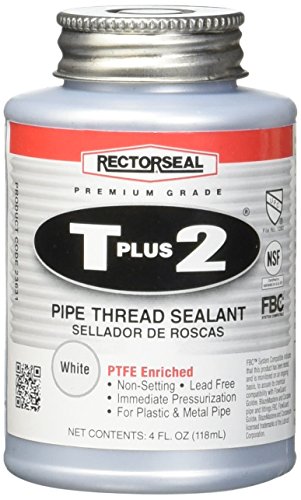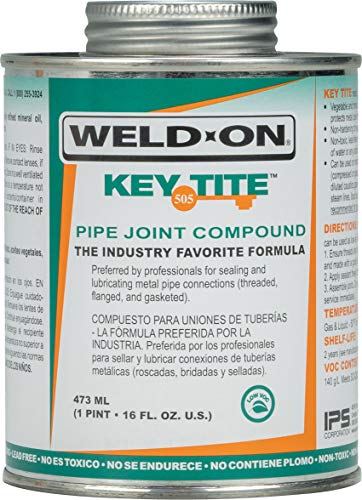by Kimberly Hill
Whether you got a new pipe or an old one, it will eventually leak without a sealant. Hence, all you need is the best pipe dope to make sure it's sealed tight and leak-proof.
Dope is a lubricant that you can apply on the pipe thread or lines before screwing it in place. This creates an air or liquid-tight seal. It also helps form a firmer bond between the joints.
Plumbers swear by it due to its liquid consistency, making it easier to apply on the thread. However, as a first-time buyer, how do you know which one performs the best?
Contents

Although all pipe dopes work the same way, its performance, in the long run, determines its quality. So for you, we've compiled a list of the best ones to make your experience better.

While you use dope to seal the pipe, it could be a challenge when it comes to taking it off and may even damage the thread! It can especially be the case for hardening sealants.
However, this non-hardening thread sealant incorporated with PTFE plus synthetic fibers can be taken off easily without a hassle or damage to the tube thread. Besides, you can use it on most materials like aluminum, galvanized steel, iron, copper, brass, polyethylene, PVC, CPVC, and ABS pipe, etc.
Likewise, the Teflon and synthetic fibers fusion of the sealant gives it a firmer, better grip in the joints. Mixed with inert mineral fillers and diffused in a resinous base, these fibers add to its strong grip.
It provides an excellent seal for water, natural gas, gas, fuels, oils, lp gas, etc. Combined with the number of materials it's possible to use on; thus, this is, without a doubt a great thread sealant and a replacement for Teflon tapes.
Key Features


Pipe dope or joint compounds are usually not made from sustainable materials that can withstand very high or low temperatures and or pressures. It makes them tough and may be dangerous to use just any ordinary product in such cases.
If you're looking to use a joint compound on a tube that passes high or low temperatures and pressure, this commercial-grade product is a great choice! It can hold off on gases up to 3000 PSI with temperatures from -50 to 400°F, and on liquids, 10,000 PSI from -50 to 500°F.
Apart from that, its non-hardening and non-separating compound make it easier to apply and take off. It's also non-toxic, making it eco-friendly and safe to use, which adds to its overall quality.
Moreover, you can safely use it with caustic or dilute acid lines of the material without any dangerous consequences and steam and water. It is suitable to use on PVC, ABS, CPVC, iron, copper, polypropylene, steel, cycolac, etc.
Key Features


Thread sealants cover the thread of the pipe entirely and keep it sealed, but with metals, there can always be a problem with rusting. It can especially happen if you have old ones. If that's one of your biggest concerns, this is a solution for you!
Specially formulated, this joint compound not only seals and lubricates but also protects it from rusting. It's usable on all types of metals and joints, be it threaded or gasketed or flanged, etc.
Besides, it can withstand piping systems containing diluted caustics and acids, alcohols, gas, natural gas, diluted alkalis, compressed air or gas, brine, hot or cold water, low-pressure steam, liquid sugar, etc. As a result, this makes it a quality, versatile product.
Furthermore, its low-VOC content of 140 grams per liter makes them safe for the health and environment. It can also withstand temperatures as low as -20°C without breaking off or losing its pressure-tight quality, adding to its durability.
Key Features


When it comes to the question of durability, you may wonder if the dope will perform well for an extended period or not. In most cases, they can break off easily within months of usage, which can be disappointing, to say the least.
In such cases, you need a heavy-duty dope, one that can withstand all sorts of conditions with ease. And luckily, this one fits all those needs! This industrial grade dope works best by ensuring it's leak-free without reapplying for a long time.
However, having developed with PTFE resin, it is non-hardening and forms a temporary, tightly secure bond between the tubes. So it makes it possible for you to replace or remove the tubes if needed. The resin is a polymer formed of reiterating tetrafluoroethylene monomers (CF2-CF2), which gives it a stronger grip.
On top of that, it's compatible with a variety of materials, adding to its high-quality and durability. You can use it on threads of all metals, and ABS, PVC, CPVC, and nylon plastic pipe systems.
Key Features


With dopes, you don't want to take any chances with the sealing because without a good seal it just defeats the purpose, and that's why you're using it for. Luckily, with this product, you're going to get only the best sealant you asked for!
Being made with the highest percentage of Teflon in the market, this dope ensures your pipes get a superior seal and lubrication. It is versatile and multi-purpose, along with providing a superior grip and bond between the tubes.
additionally, it can hold against vibrations, contraction, and expansion tightly, without any leak or damage. Thus, it adds to the superior sealing quality of the product. It is also non-separating and requires no cure time, making it fast, easy, and efficient.
Accordingly, it's compatible with various metals like galvanized steel, aluminum, black iron, stainless steel, copper, brass, etc. Along with that, you can use them on PVC, CPVC, and ABS pipes, including plastics as well.
Key Features

When choosing a pipe thread sealant, there are many factors to consider. The most important thing is to select the right product for the job. There are many types of pipe thread sealants available on the market, and each has its own advantages and disadvantages. In this blog post, we will discuss the different types of pipe thread sealants and help you choose the right one for your needs!
Pipe thread sealants are classified into two categories: mechanical and chemical. Mechanical pipe thread sealants rely on their physical properties to create a seal, while chemical pipe thread sealants use a chemical reaction to create a seal.
The most common type of mechanical pipe thread sealant is Teflon tape. Teflon tape is a thin, plastic tape that is wrapped around the threads of a pipe to create a seal. Teflon tape is easy to use and can be applied by hand. It also conforms well to irregular surfaces, making it ideal for use in tight spaces. However, Teflon tape is not very durable and can break down over time. It is also not recommended for use with high-pressure applications.
Pipe dope is a sealant that is used to prevent leaks in pipes. It can be used on metal, plastic, or rubber pipes. There are different types of pipe dope available, so it is important to choose the right one for your needs.
The type of pipe dope that you need will depend on the material of your pipes. If you are using metal pipes, you will need a sealant that is resistant to corrosion. If you are using plastic or rubber pipes, you will need a sealant that is compatible with those materials.
When buying pipe dope, you should look for a product that is easy to apply and has a long lasting seal. It is also important to choose a sealant that is compatible with the material of your pipes.
Pipe dope is a sealant that is used in plumbing to prevent leaks. It is a viscous, colorless substance that comes in a variety of brands.
There are three main types of pipe dope: Teflon, silicone, and latex. Teflon is the most popular type, as it is non-toxic and resistant to high temperatures. Silicone is also non-toxic, but can be damaged by heat. Latex is the cheapest option, but it can deteriorate over time.
Pipe dope offers a number of benefits:
Pipe dope is easy to use. Simply apply a thin coat to the threads of the pipe and screw the fitting in place. Be sure to wipe off any excess before you start your plumbing project.
If you have a leak, first try tightening the fittings. If that doesn't work, remove the fittings and apply pipe dope to the threads before reassembling them. If you are still having problems, call a plumber for assistance.
Pipe dope can be used on metal pipes, but it is not recommended. Metal pipes can corrode over time, and the pipe dope will only make the problem worse. Instead, use a sealant specifically designed for metal pipes.
Yes, you can use pipe dope on PVC pipes. However, it is not necessary. PVC is a non-toxic material, and it is already designed to resist leaks.
If you are having difficulty using pipe dope or if you are experiencing a plumbing emergency, call a plumber for assistance. They will be able to help you get your plumbing back up and running in no time.
It doesn't matter if you're a plumber or an ordinary person, with the best pipe dope you can ensure the best seal and protection to your piping system. Remember to not cheap out! A little goes a long way, and a quality dope can save you from many hassles in the future.
Therefore, consider the condition of the pipe and the system you will be using to find the perfect one. It's always safe to go with one that's suitable for almost all kinds of materials and piping system, especially if you're a plumber.
You don't need to look hard to find the one that meets your needs and standards! With the help of our convenient list, you can efficiently get started with sealing your system!
Hercules 15620 Real-Tuff Heavy Duty PTFE Pipe Thread Sealant, White, 8 oz - Walmart Link
Rectorseal 31551 1/2 Pint Brush Top Tru-Blu Pipe Thread Sealant, Blue - Walmart Link
Rectorseal 23631 1/4 Pint Brush Top T Plus 2 Pipe Thread Sealant - Walmart Link
Hercules 15620 Real-Tuff Heavy Duty PTFE Pipe Thread Sealant, White, 8 oz - eBay Link
Rectorseal 31551 1/2 Pint Brush Top Tru-Blu Pipe Thread Sealant, Blue - eBay Link
Rectorseal 23631 1/4 Pint Brush Top T Plus 2 Pipe Thread Sealant - eBay Link

About Kimberly Hill
Now it is just me, Kimberly Hill living in New York city, N.Y.
Loves to blog about various aspects of life that matter most.
Received the BA degree in Art History from Stanford University of California.
 |
 |
 |
 |